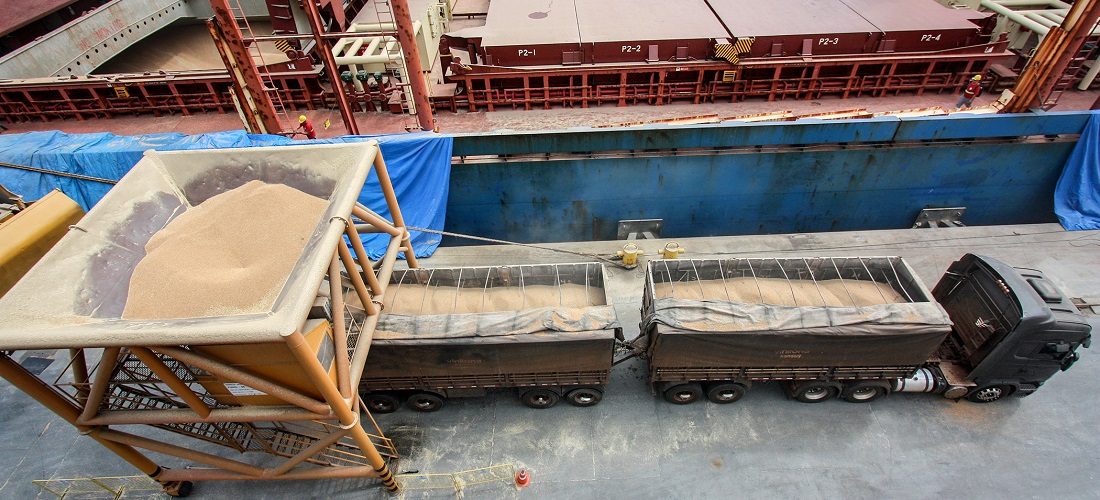
Landing of cereals by the Port of Paranaguá grows
Oct, 14, 2019 Posted by Sylvia SchandertWeek 201942
The importation of malt and barley entering the Port of Paraná increased by 29% in the comparison between January to September 2019 with the same period last year. Another import bulk that showed an increase at the end of the period is wheat: 33% more than cereal.
In the first nine months of this year, 385,700 tons of malt and barley were landed by the Port of Paranaguá. In the first nine months of 2018, the volume totaled 299,400 tons of bulk.
The 63 ships that arrived loaded with the products from January to September this year brought these cereals from Argentina, Uruguay, Spain, Australia, and Ukraine, with the destination being Paraná itself.
One of the main importers of malt and barley entering the Port of Paranaguá is the Agroindustrial Agrária Cooperative. Malt’s commercial coordinator, Alexandre Klarke, explains that the weather conditions during the last cycle have reduced the national barley crop. To meet domestic demand, it was necessary to import a larger volume.
“Regarding malt, there was an increase in beer consumption in the country between September last year and March this year. The main hypothesis to explain this movement is that the buyers of the product bet that the increase in beer consumption would continue,” says Klarke.
The following chart, made from Datamar DataLiner data, shows imports of malt and barley from January 2015 to August 2019 in Paranaguá Port:
Source: DataLiner/Datamar
Industry
As a malt producer, all barley imported by Agrária, according to the sector’s commercial coordinator, is used within the industry itself.
“Brazil is a country that does not produce all the barley that the industry needs for production, that is why the cereal needs to be imported. Today we supply our malt to over 1,200 breweries in Brazil, from the large brewer groups to the nano breweries,” says Klarke.
The expert points out that something similar happens with wheat. “We need to look abroad, as the country does not produce enough to serve the domestic market,” he adds.
Wheat
This year, until September, cereal imports totaled 287,500 tons. In the same nine months of 2018, the volume was 216,700 tons. This year, 109 ships docked to land the product in the Port of Paranaguá. The origin is mainly Argentina.
Both wheat, malt, and barley were unloaded in bulk and, to a lesser extent, in containers. The amount of wheat that arrived in containers was 9,400 tons, while malt and barley was just over 15,000 tons.
Operation
According to the Director of Operations of the Ports of Paraná, Luiz Teixeira da Silva Júnior, in the Port of Paranaguá, in bulk landing, cereals have priority in the preferred berth for the unloading of products, which is the 206, as determined by the work order number 145/2018.
“These operations must meet a minimum productivity of 6,000 tons per day. When these ships arrive in Paranaguá with these products they are in a single line to occupy the preferred berth. It is the arrival date that counts for the order of the queue,” he explains.
In the total of solid bulk imports, according to the balance of the nine months of this year, there were about 7.6m tons unloaded in the Port of Paraná. In addition to cereals, this volume includes fertilizers and salt imported in the period.
Antonina
In the importation of fertilizers, the highlight is the increase registered by the Port of Antonina. There, from January to September, 380,100 tons of fertilizers were discharged, 34% more than in 2018, with 283,600 tons.
In Antonina, in the period, total cargo handling reached 622,900 tons. In addition to imported fertilizers, exports of sugar and soybean meal also increased.
The amount of sugar was 48,919 tons – 59% more than the volume registered last year: 30,733 tons. Of bran, 193,856 tons, 0.5% more than the volume of 2018: 192,963 tons.
The total movement of the Ports of Paraná from January to September this year totaled 39.7m tons. Of this volume, 26.2m solid export and import bulk only: grains, bran, cereals, salt, and fertilizers.
-
Blog Statistics (ENG)
Oct, 10, 2023
0
East Coast South America Top Trading Countries | Jan-Aug 2023 vs. Jan-Aug 2022 | DataLiner
-
Meat
Feb, 28, 2019
0
Marfrig records first profit since 2010, while BRF’s fate falls
-
Ports and Terminals
May, 19, 2023
0
Chile’s largest port reaches fourth month with negative numbers
-
Economy
Mar, 14, 2024
0
Brazil Eyes Farm Exports to India and Africa With EU Deal Deadlocked



